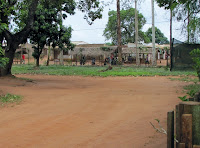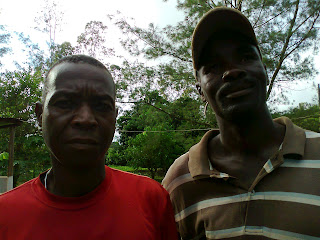I soon found the days merging into the first fortnight of my three months stay in Morrumbala, Mozambique, before returning to work in England in the New Year.
My Portuguese was slowly improving, as much to my delight; I discovered some really good web-sites that offered free lessons. Logging on to them has become part of my daily routine, - if the Internet is working, - before settling down to writing my 1000 words a day. (This has not been very difficult to carry out. There are not many distractions here.)
 |
| The Shanty-Town at the foot of my garden. |
My lap-top was set up the next day of my arrival on the table in the lounge/dining room which is the coolest place in the house where there is an air-conditioner and a ceiling fan. Both of them work 24/7, pushing the heavy air around.
 |
| My new Home |
Pedro had cleaned the dust and grease off all the surfaces in the house and kitchen, laundered the shower curtain that surprisingly turned out to be white and not brown in colour, and had got used to the idea that sheets on our bed had to be washed and changed once a week.
The gardens in the OLAM complex had been sorely neglected for two years since the present management take-over and to alleviate total boredom, I happily became involved with revamping them. After all, there is a gardener allocated to each of the five staff houses, and two at the company office block. The only gardens that looked as if they had been cared for when I first arrived appeared to be the one surrounding the offices. The rest were swept yards with a vegetable garden in ours that Graham had started in anticipation of my arrival, (he knows I love eating salads, and leafy green stuff!)
On occasion, when Graham does not have to take one of his cotton supervisors with him on his trips to the peasant farmer cotton out-growers in the Zambezia Province areas, he phones me and asks “Fancy a road tip today?”
Always happy at a foray out of the confines of the OLAM complex, and excited about seeing a new area which may reveal good photo opportunities, I never turn the offer down. So, I quickly put a bag together with my cameras, a couple of bottles of water and make up filled rolls for a picnic lunch.
| An OLAM Bush Station |
Some of the places Graham has to visit are as much as two hours’ drive away from Morrumbala, making the round trip a good four hours. This excludes the stops at the OLAM cotton stations and the peasant farm smallholdings. It is a long day in the hot sun and the bush roads are like rusty old roller-coasters that rattle one’s bones and teeth!
On our first trip together, we went to an area called Lipembe.
En route we were stuck behind a funeral procession. It was interesting to see that all the mourners on the road and surrounding our pick-up were men. The vehicle carrying the coffin had women sitting around it, keening and howling. They sounded like very sad banshees.
| Women Mourners |
One of the men stopped us and warned us to go very slowly. So Graham slowed right down, (when in Mozambique, or any African country for that matter, listen to the man on the street, it can save you a great deal of mis-understandng and trouble!) The men swarmed around our truck and we kept a respectable speed.
Rolling down his window, Graham asked the man who was walking next to us in his local African language, who the person in the coffin in front of us had been, “Businessman, big businessman. Many wives, many goats, many children” was the answer.
| The Funeral Procession |
Eventually the procession pulled off into the entrance of the local school and we were able to proceed. It was good to get away from such a woeful crowd.
Soon after leaving the funeral, we saw a truck bumping along the track towards us. It had a load of people sitting in the back, clinging on for their dear lives. “Ah, that’s one of my more wealthy farmers” said Graham, slowing down.
“Hello Patrick” Graham greeted the man driving the overloaded vehicle. Patrick stopped his transport, jumped out the door and rushed over to greet Graham enthusiastically.
I was duly introduced, “Patrick, this is my wife.”
| Patrick's Passengers |
He looked me over, “Very nice, I think you should give her to me. She can come and live in my house and stay with me.”
He and my husband continued to discuss this idea for a while. From what I understood, Graham thought it better that I came home with him as I was far too cheeky for Patrick.
Graham winked at me and we drove off.
I think Graham knew that I’d be very cheeky towards him if I’d been handed over to Patrick. I am used to “living it rough” in the bush, but I have no intention of going to live in some mud hut and have the lesser status of a minor tenth wife!
| Graham with his Station Managers |
What impressed me on that road trip and with other trips that have followed is the affection all the OLAM station managers and the farmers appear to have for Graham. He has a way of encouraging the African people to be more productive. Also the fact that he speaks three of their languages goes a long way to good communication and understanding. Since he has been working for OLAM the ammount of
cotton planted by the outgrowers have increased from 600 hectares to an expected 6000 hectares in six months, something the company has
never seen before.
never seen before.
Late that afternoon, upon return to Morrembala, Graham stopped off at a house in the town. Asking him where were, he told me he wanted me to see some of the staff houses that had been built for “upper” Mozambican staff working for OLAM. There was a street of small brick homes with corrugated roofing, each with about a ¼ acre of garden and fenced.
“Very nice”, I remarked, “the people must be thrilled to have homes like this.”
“Yes and no.” Was Graham’s answer, “The houses have been here for a couple of years, equipped for running water, but never had it connected. The workers have to come into the OLAM complex every day and collect water in drums from our borehole there.”
Shocked, I said to him, “But what about sanitation?”
I was well aware that the huge mud hut village that has evolved on the outskirts of Morrembala and stops at the borders of the OLAM security fencing is pretty “rough and ready”. They have to go to the toilet in the bush on the outskirts of the village, but the basic infrastructure of the actual town of Morrumbala was created in the Portuguese era, with proper buildings, houses and sanitation.
These houses were built in this part of the town and should have all the luxuries of the senior management houses and offices have within the complex.
 |
| Shanty-Town Children and Guinea Fowl. |
With a huge sigh, Graham said to me “My immediate boss seems unwilling to fork out and get a decent borehole dug to service the houses. But I am working on it even although housing is not my department.” He went on to say, “There is an Indian company here with borehole rigs and I aim to get one sunk as soon as I can convince the OLAM powers that be in Beira to part with some funds.”
This was two months ago and I’m proud to say that the bore-hole is now sunk and as of a fortnight ago, the houses have running water. Graham tells me he was very touched when he walked into the OLAM offices and received a standing ovation from the staff. They were very grateful that someone had cared enough about their personal welfare.
I have started to see a pattern here with OLAM. It appears to me, (and this is a personal observation) that they think that if you are working for them and they supply a house to live in, you should be overwhelmed with having a roof over your head. No matter what the condition. Also, if terms are not met in a workers contract, such as a company vehicle that is meant to be supplied and does not materialize, the worker/s should still carry on, making no complaints because they have a house, with or without lights and running water!
If you enjoy my writing, purchase my books and EBooks:
Read my daily Blog:
“Like” me:
Buy Wallabok Wear:




